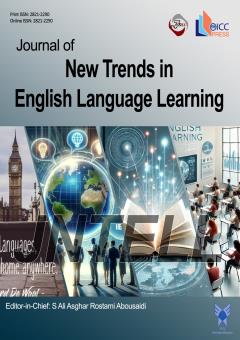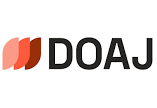About the journal
🚨Announcement🚨
Journal of New Trends in English Language Learning( JNTELL)
Publisher Change Announcement:
Since the publication of Volume 4 ,Issue 1 Spring,2025 of JNTELL Journal is transferred to OICC Press
So, the submission can be made via the following link :
https://oiccpress.com/jntell
All accepted papers will be available on the new site .
OICC Press Contact Details:
Address: Stroud Court, Oxford Road, Eynsham, Whitney, Ox294DA, Oxfordshire, UK.
Tell: 0044 1865 884350
E-mail address: contact@oiccpress.com
Contact & Complaint form: https://oiccpress.com/contact-us-oicc-press/
● Contact Journal Director in Charge :
nedafatehi@yahoo.com
● Cellphone :+98 9133987299
اطلاعیه
مجله زبان انگلیسی نگرش جدید در یادگیری زبان انگلیسی از ژانویه ۲۰۲۴ به ناشر
بین المللی ( oicc press) می پیوندد .لذا پذیرش مقالات در پنل جدید خواهد بود و چاپ مقالات جلد بهار توسط ناشر بین المللی انجام خواهد شد
خواهشمندست فابل همانندجویی زیر ۱۵ درصد وفایل گزارش گرامرلی را ضمیمه نمایید
About the Journal
Journal of New Trends in English Language Learning (JNTELL), ISSN 2821-2290 ,is an online, open-access, double-blind, and peer-reviewed academic journal published quarterly by the Islamic Azad University, Kerman Branch, Kerman, Iran(A RANK). The journal is dedicated to disseminating reports of the findings of the original and innovative research of conceptual, theoretical, empirical, and practical nature, covering niches and issues related to current trends and topics of pedagogy and practices in the field of teaching and learning of English as an International Language (EIL) or as a Foreign Language (EFL), from either a disciplinary or multi-disciplinary perspective. Providing a medium for informed debate of the principles and practices that determine how English is learned and taught nationally or internationally, JNTELL seeks to provide a forum for members of the profession worldwide, including (but not limited to) scholars, faculties, practitioners, and professionals to exchange knowledge in the form of empirical and theoretical research articles and review papers (systematical reviews, meta-analysis, and book reviews). Promoting diverse perspectives and critiques, JNTELL is particularly interested in articles that challenge the taken-for-granted issues in English language pedagogy, Translation Studies, Linguistics, Discourse Analysis, Applied Linguistics, Sociolinguistics, and Psycholinguistics. The journal especially welcomes contributions focusing on learning dynamics and the experiences of efficacious language programs in Iran, connecting academicians’ visions and insights gained from related disciplines with practitioners’ everyday concerns addressing real-world problems. To care for our environment and take action on global warming and climate change, we at JNTELL decided not to publish the journal in print version.
Note:Please in the Final Stage of Uploading Revised Version of Your Work Include: Authors Affiliations, Tittle,Abstract,KeyTerms (Perisan),and Biodata.
JNTELL assumes that the submitted articles have not previously been published and are not being considered for publication elsewhere. The journal rigorously observes the standards and guidelines provided by the Committee on Publication Ethics (COPE), especially regarding misconduct, fraud, plagiarism, and how to take action on these issues. The journal strictly follows a Zero Tolerance Policy on Plagiarism. We recommend authors check their articles with plagiarism prevention tools (such as ithenticate.com, turnitin.com, etc.) before submitting them to JNTELL. After initial editor screening, all articles undergo a rigorous double-blind peer review process. Authors must transfer the copyright and conflict of interest form provided in author guide lines section to JNTELL by signing the copyright form and submitting it with the main manuscript. Users have the right to read, download, copy, distribute, print, search, or link to the full texts of articles under the following conditions: Creative Commons Attribution-NonCommercial-ShareAlike 4.0 International (CC BY-NC-SA 4.0).
This work is licensed under a Creative Commons Attribution-NonCommercial-ShareAlike 4.0 International License.
Open Acess by DOAJ (Directory of Open Access Journals)This is an open-access journal which means that all content is freely available without charge to the user or her, institution. Users are allowed to read, download, copy, distribute, print, search, or link to the full texts of the articles, or use them for any other lawful purposes, without asking the publisher's or the author's prior permission. This is in accordance with the BOAI definition of open access.Plagiarism Report
All submissions must include a similarity report. Without a similarity report, submissions would be rendered incomplete and not processed under any circumstances. Thank you for standing with us to eliminate plagiarism and develop academic integrity.
![]()
Copyright
All Authors are requested to complete Journal's copyright form and submit it along with their papers.
Conflicts of Interest Form
All Authors are requested to complete Journal's conflicts of interest form and submit it along with their papers.
Processing Charges
The publication charge is about 50 $ per paper.

-
Open Access Article
1 - Teacher Training or Teacher Draining: A Critical Analysis of Iranian Teacher Training Courses (TTC)
Hamed Zarabi * ، Nadia Gharani ، Nima YamraliIssue 2 , Vol. 2 , Summer 2023 -
Open Access Article
2 - Exploring the Effectiveness of Artificial Intelligence (AI) on Reading Comprehension among Iranian EFL Learners
Mahdi Yousefi ، Mohammad Iman Askari *Issue 5 , Vol. 3 , Autumn_Winter 2024 -
Open Access Article
3 - Introversion and Extraversion of female characters in Gillian Flynn's Gone Girl: A Jungian Reading
Zeinab Sharghi ، Hassan Shahabi *Issue 4 , Vol. 3 , Winter 2024 -
Open Access Article
4 - The Interrelationship between Literature and Language Teaching: Drama and Speaking
Hamed Badpa * ، Parivash Zare Behtash ، Esmail Zare BehtshIssue 1 , Vol. 3 , Spring 2024 -
Open Access Article
5 - Relationship between Critical Thinking Ability and Listening Comprehension Strategies: Focus on Advanced EFL Learners
Azar Bagheri Masoudzade *Issue 1 , Vol. 1 , Spring 2022 -
Open Access Article
6 - The Role of Critical Thinking Disposition in Enhancing Argumentative Writing Skill: Iranian EFL Teachers’ and Learners’ Perspective
Shaho Hoorijani ، Hossein Heidari Tabrizi * ، Mohsen MasoomiIssue 2 , Vol. 1 , Summer 2022 -
Open Access Article
7 - Academic procrastination from attribution theory perspective: An overview
Mehdi Haseli Songhori * ، Kimiya SalamatiIssue 2 , Vol. 2 , Summer 2023 -
Open Access Article
8 - The Frayer Model Effectiveness in the LSP Vocabulary Development: The Case of English for Iranian Computer Sciences Majors
Mahmoud Jafarie ، Hossein Heidari Tabrizi *Issue 4 , Vol. 1 , Winter 2022 -
Open Access Article
9 - Implementation of Reciprocal-scaffolding Treatment in Virtual Learning Context: Iranian EFL Learners’ Listening and Speaking Skills
Marzieh Sabzevari ، Neda Fatehi Rad * ، Masoud TajaddiniIssue 2 , Vol. 1 , Summer 2022 -
Open Access Article
10 - Seasoned and Novice English Teachers’ Perceptions of ‘Prospect 2’: A Critical Exploratory Study on Teaching Experience
Hossein Issaee * ، Hamed BarjestehIssue 1 , Vol. 3 , Spring 2024















